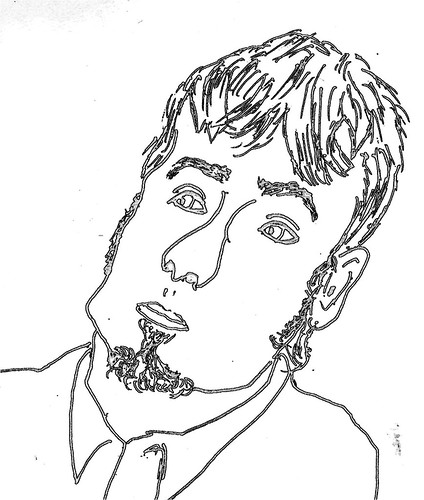Manuel Rueda: At home Iraq Veterans Against the War, a grassroots organization of vets opposed to US wars, continues to organize Winter Soldier hearings across the country. It´s a venue where veterans from Iraq and Afghanistan can tell stories from their war days, in a venue where veterans can tell stories from their war days in an environment that's safe and supportive. Leo Paz reports from Los Angeles.
Leo Paz: Ryan Endicott is a former Marine Corporal who did multiple tours in Iraq and returned to the US in 2006. He talked about what it's like for US marines to enforce martial law in a foreign country.

Ryan Endicott: Young boys 18 to 22 are having martial law over a group of people. It's complete oppression and it actually borders on the line of terrorism. I mean you strap dead bodies to your Humvee and drive around a city with it, that's terrorism. That's scaring a group of people into your beliefs -- into your belief system and structure and that's exactly what we're doing, we're terrorizing them.
Leo Paz: Corporal Endicott who was in Ar Ramadi, Iraq says these were not isolated incidents but daily occurrences.
Ryan Endicott: Every single day, every time you kick in a door and drag a man out of his bed in the middle of the night, that's terrorism. That's not -- we're not saving people that's not liberation. You don't liberate people by -- by kicking in their doors in and arresting people by mass numbers by shooting them that's not liberation, that's occupation.
Leo Paz: Some of the soldiers recalled the harsh treatment of Iraqi civilians stopped at the numerous checkpoints installed by the US throughout the country. Former Marine Corporal Christopher Gallagher compared the checkpoints in Haditha and Falluja to herding cattle.

Christopher Gallagher: If any Iraqis voiced their opinion for the way they were being treated the Iraqi police -- we had a checkpoint -- would handle the situation by harassing and assaulting them.
Leo Paz: According to Gallagher when the US military went door to door in the middle of the night, raiding homes to eliminate any resistance to the occupation, Iraqis held massive protests. Gallagher described the typical US response to this protest.
Christopher Gallagher: In 2004 the Iraqis would hold protests in the town of Haditha against the occupation typical response for this was to have fighter jets fly over the crowd and scare them away.
Leo Paz: Corporal Endicott questioned the sanitized version of war portrayed in mainstream American media.
Ryan Endicott: What should be on the media is the thousands of doors that are kicked in every day and the thousands of people that are terrorized by the US soldiers that are pumped up on adrenaline and just looking to kill people. I mean there's plenty of people that joined the military just to kill people.
Leo Paz: Endicott is one of many vets who denounced the indiscriminate shooting of civilians by US military. Devon Read a former Marine infantry Sgt who took part in the invasion of Iraq in 2003 saw comrades anxious to fire at whatever came in their path. He told people at winter soldier about driving through Nazaria, speeding on the way to Baghdad, on the back of a Humvee and Marines in his unit shooting randomly at people in houses.

Devon Read: You know, none of the grunts that wanted to shoot people really cared about that. If it was an opportunity to shoot someone, they'd be shooting. So there's two of us on my side of the vehicle and three guys on the other side of the vehicle and we're facing outboard and suddenly the guys on the other side of the vehicle start shooting and I'm curious what the heck they're shooting at but I can't really look because I'm paying attention to my side and the other guy that's with me decides to switch sides, switches over to the other side and starts shooting also. And I finally take a moment to look and I'm looking and they're all just shooting wildly.
Leo Paz: Sgt. Reed was appalled by the random gunfire and wondered how many civilians had been shot by US troops that day.
Devon Read: There's, you know, people in windows way off in the distance, who really knows? Plenty of civilians with their -- poking their heads out of the window but its just someone to shoot at and there's shooting going on so no one's going to ask any questions if they start pulling the trigger too. So everyone starts shooting randomly and I talk to everyone after and none of them had any idea what they were shooting at or why.
Leo Paz: Many Vietnam war vets showed up to support the IVAW and the Iraq veterans in denouncing war and violence. Ed Garza an army gunner with the 173rd airborne Brigade still has nightmares forty years after the war.
Ed Garza: I remember the dead bodies and I remember seeing them and I remember we used to kill the Vietnamese and we'd put our patch on them To remind the other Vietnamese in the area that uh that we were there, the 173rd airborne. So those are some of the things I remember.
Leo Paz: According to a study conducted by Iraqi doctors, and published in a British medical journal, Iraqi dead are in the hundreds of thousands since the US invasion in 2003, Afghan civilians are estimated at more than 10,000 dead. Now into the 8th year of the war, more than 5,000 soldiers have been killed in Iraq and Afghanistan according to the US military. Leo Paz, FSRN.